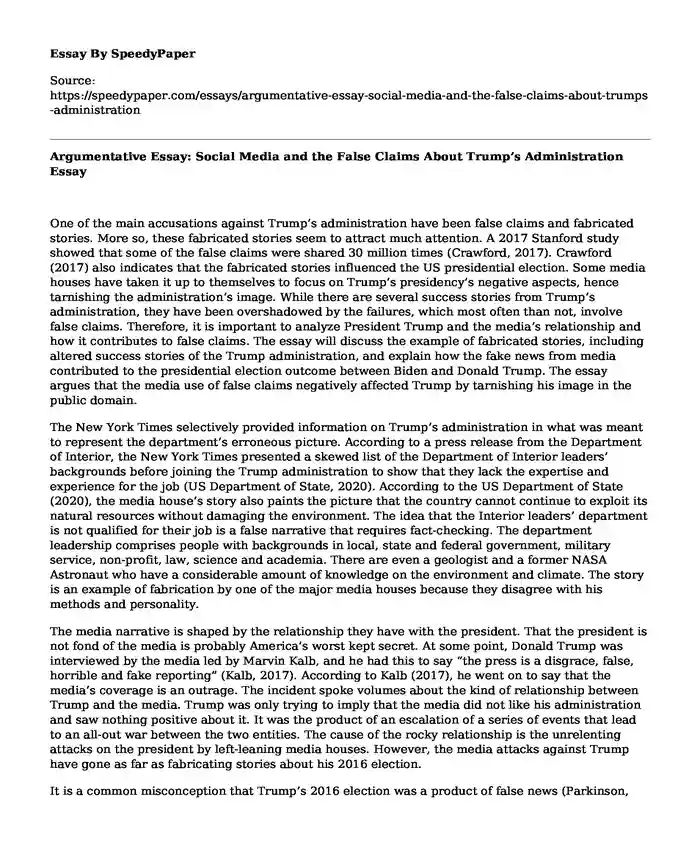
| Type of paper: | Argumentative essay |
| Categories: | Political science Social media Donald Trump |
| Pages: | 3 |
| Wordcount: | 722 words |
One of the main accusations against Trump’s administration have been false claims and fabricated stories. More so, these fabricated stories seem to attract much attention. A 2017 Stanford study showed that some of the false claims were shared 30 million times (Crawford, 2017). Crawford (2017) also indicates that the fabricated stories influenced the US presidential election. Some media houses have taken it up to themselves to focus on Trump’s presidency’s negative aspects, hence tarnishing the administration’s image. While there are several success stories from Trump’s administration, they have been overshadowed by the failures, which most often than not, involve false claims. Therefore, it is important to analyze President Trump and the media’s relationship and how it contributes to false claims. The essay will discuss the example of fabricated stories, including altered success stories of the Trump administration, and explain how the fake news from media contributed to the presidential election outcome between Biden and Donald Trump. The essay argues that the media use of false claims negatively affected Trump by tarnishing his image in the public domain.
The New York Times selectively provided information on Trump’s administration in what was meant to represent the department’s erroneous picture. According to a press release from the Department of Interior, the New York Times presented a skewed list of the Department of Interior leaders’ backgrounds before joining the Trump administration to show that they lack the expertise and experience for the job (US Department of State, 2020). According to the US Department of State (2020), the media house’s story also paints the picture that the country cannot continue to exploit its natural resources without damaging the environment. The idea that the Interior leaders’ department is not qualified for their job is a false narrative that requires fact-checking. The department leadership comprises people with backgrounds in local, state and federal government, military service, non-profit, law, science and academia. There are even a geologist and a former NASA Astronaut who have a considerable amount of knowledge on the environment and climate. The story is an example of fabrication by one of the major media houses because they disagree with his methods and personality.
The media narrative is shaped by the relationship they have with the president. That the president is not fond of the media is probably America’s worst kept secret. At some point, Donald Trump was interviewed by the media led by Marvin Kalb, and he had this to say “the press is a disgrace, false, horrible and fake reporting” (Kalb, 2017). According to Kalb (2017), he went on to say that the media’s coverage is an outrage. The incident spoke volumes about the kind of relationship between Trump and the media. Trump was only trying to imply that the media did not like his administration and saw nothing positive about it. It was the product of an escalation of a series of events that lead to an all-out war between the two entities. The cause of the rocky relationship is the unrelenting attacks on the president by left-leaning media houses. However, the media attacks against Trump have gone as far as fabricating stories about his 2016 election.
It is a common misconception that Trump’s 2016 election was a product of false news (Parkinson, 2016). However, evidence from Crawford (2017) indicates that that claim is false and might be one of the many fabrications against Trump and his administration. According to Crawford (2017), robust data maintains that false or fake news stories might not have been persuasive and influential enough during the first Trump’s election. However, the economist behind the study failed to conclude whether the fake news swayed Trump’s previous administration (Crawford, 2017).
References
Crawford, K. (2017, January 18). Stanford study examines fake news and the 2016 presidential election. Stanford News. https://news.stanford.edu/2017/01/18/stanford-study-examines-fake-news-2016-presidential-election/
Kalb, M. (2017, February 21). Trump’s troubling relationship with the press. Brookings. https://www.brookings.edu/blog/up-front/2017/02/21/trumps-troubling-relationship-with-the-press/
Parkinson, J. H. (2016, November 14). Click and elect: how fake news helped Donald Trump win a real election. The Guardian. https://www.theguardian.com/commentisfree/2016/nov/14/fake-news-donald-trump-election-alt-right-social-media-tech-companies
US Department of the Interior. (2020, January 14). Correct the record: New York Times continues false attacks against Trump administration. https://www.doi.gov/pressreleases/correct-record-new-york-times-continues-false-attacks-against-trump-administration
Cite this page
Argumentative Essay: Social Media and the False Claims About Trump's Administration. (2024, Jan 24). Retrieved from https://speedypaper.net/essays/argumentative-essay-social-media-and-the-false-claims-about-trumps-administration
Request Removal
If you are the original author of this essay and no longer wish to have it published on the SpeedyPaper website, please click below to request its removal:
- Essay Example: Exploring Political Discourse
- Free Essay: South Carolina Declaration and Abraham Lincoln's First Inaugural Address
- United States Democratic System, Essay Sample on Political Science
- Free Essay on Evolutionary, Physical and Cultural Relationships between Our Species and Neandertal
- Essay Sample on Occupational Hygiene Methods
- Essay Sample on The Gods Must Be Crazy Film Review.
- Free Essay on History Yesterday and Today
Popular categories




